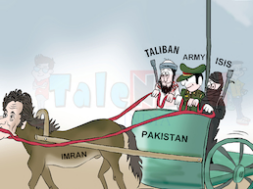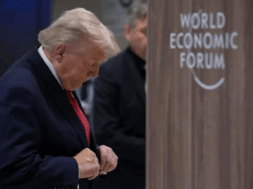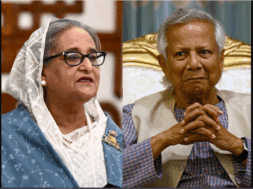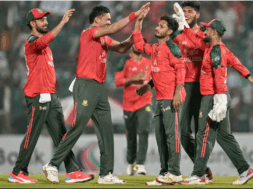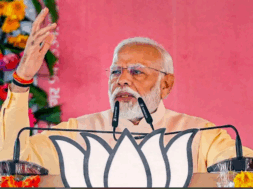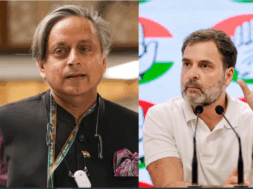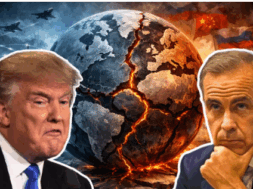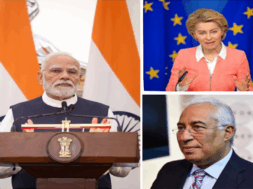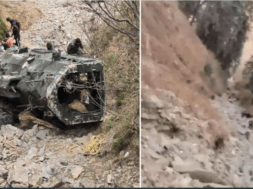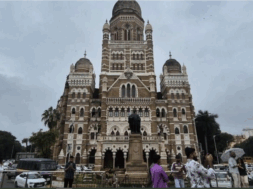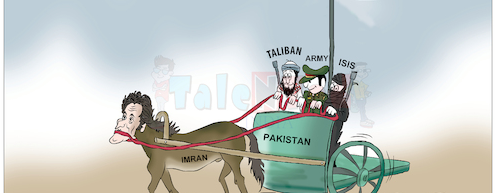
Taliban: With Haqqanis in driving seat, Imran warns of a “civil war” in Afghanistan
Virendra Pandit
New Delhi: Two weeks after its Inter-Services Intelligence (ISI) chief Lt. Gen. Faiz Hameed pushed the Taliban to populate its “interim” government in Kabul with Pakistan-controlled Haqqani Network, Prime Minister Imran Khan has warned of the risk of a civil war in Afghanistan if the Taliban is unable to form an “inclusive government” in Kabul.
Of the 33 Cabinet ministers announced on September 7, as many as 30 are Pashtuns, many of them from the Pakistan-based Haqqani Network. Only one of the remaining three, Mullah Abdul Salam Hanafi, an Uzbek has been given any significant post, as the Second Deputy Prime Minister. And no women exist in the current Afghanistan government.
But Imran Ahmed Khan Niazi is making all the right, politically correct noises, trying to impress world leaders. He is still talking of an “inclusive government” without which, he claims, a war-torn Afghanistan might face a civil war.
“If they do not have an inclusive government, and gradually it descends into a civil war, which is if they do not include all the factions sooner or later (will happen), that too will impact Pakistan,” Khan told the BBC on Tuesday.
He said Pakistan was primarily concerned about the possibility of a humanitarian and refugee crisis if a civil war breaks out, and also the possibility of Afghan soil being used by armed groups fighting against the Pakistani government (the Tehreek-e-Taliban Pakistan, or TTP).
“It will mean an unstable, a chaotic Afghanistan,” he said, media reports said.
“It is an ideal place for terrorists, because if there is no control or if there is fighting going on. And that is our worry. So terrorism from Afghan soil, and secondly if there is a humanitarian crisis or a civil war, a refugee issue for us.”
Earlier, the Taliban had ‘rejected’ Khan’s calls for changes to the current interim Afghan government. The Islamist militia’s spokesman Mohammad Mobeen had said the group does not “give anyone the right to call for an inclusive government”.
“We have got freedom. Like Pakistan, we reserve the right to have our own system,” Mobeen said told Afghanistan’s Ariana TV on Monday, claiming that the current system was “inclusive”.
The same day, the new deputy information minister, Zabihullah Mujahid, said the militia would address international human rights concerns only after receiving formal recognition by those countries.
“As long as we are not recognized, and they criticize us, we think it is a one-sided approach. It would be good for them to treat us responsibly and recognize our current government as a responsible administration,” Mujahid told Afghanistan’s Tolo News.
Faced with the TTK’s terror blowing back, and the mounting refugee problem, Pakistan has repeatedly called for the world to engage with the Taliban’s interim government to stave off the possibility of a collapse of Afghanistan’s economy and infrastructure in the absence of central bank funds.
An estimated USD 10 billion in Afghan central bank funds remain frozen in foreign bank accounts, particularly with the US Federal Reserve, following the Taliban’s takeover of the government on August 15.
Pakistani Foreign Minister Shah Mahmood Qureshi reiterated a call on Monday for unfreezing of these funds to facilitate the smooth functioning of the Afghan government’s institutions, including schools and hospitals.
“On one hand, you’re raising fresh funds to avert a crisis, and on the other hand, money that is theirs – belongs to them – they cannot use,” Qureshi said in New York where he is attending the UN General Assembly meeting.
“I think freezing the assets is not helping the situation. I would strongly urge the powers that be that they should revisit that policy and think of unfreezing,” he said.
Pakistan was a key ally of the previous Taliban government in Afghanistan (1996 and 2001). But this time Islamabad is yet to recognize the armed Islamist group’s new government in Kabul, claiming that any decision on recognition would require regional consensus.
As a matter of fact, if it recognized the Taliban government in Kabul, Islamabad is concerned that it could be black-listed immediately by the Financial Action Task Force (FATF), the international watchdog on terror-financing, which has so far kept Pakistan hanging on the grey list.
That Pakistan is covertly and fully supporting the new Afghanistan government became clear this week when it tried to push in the Taliban leaders into the South Asian Association for Regional Cooperation (SAARC) as Kabul’s new representatives, forcing the regional group to cancel a meeting.
Khan, who recently attended a summit of regional countries and Russia and China under the aegis of the Shanghai Cooperation Organisation (SCO), said that recognition would depend on three factors.
“All of us (in the SCO) decided that we would collectively take a decision to recognize Afghanistan, and that decision will depend on will they have an inclusive government, their assurance of human rights, and that Afghan soil should not be used for terrorism, and neighbors are the most worried about that.
The Taliban has come under international fire for the all-men structure of their interim government and barring girls from attending schools. Ethnic minorities have also not been represented adequately.
Khan said Pakistan would push the Taliban to form a politically and ethnically inclusive government, “because there will not be any long term sustainable peace or stability unless all the factions, all the ethnic groups, are represented”.
